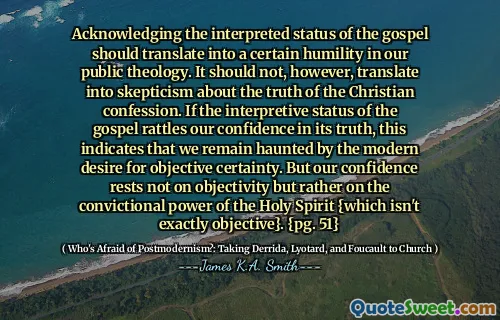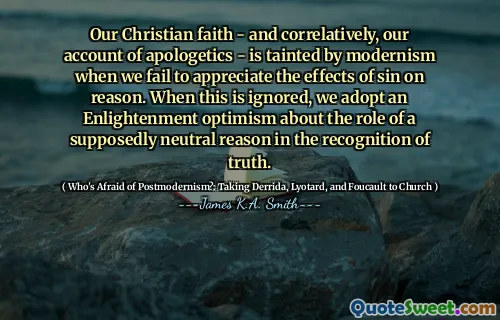"Who's Afraid of Postmodernism?" by James K.A. Smith explores the implications of postmodern thought, particularly the works of Derrida, Lyotard, and Foucault, and how they relate to faith and the church. Smith argues that these philosophers challenge traditional ways of understanding truth and meaning, which raises important questions for religious belief. By engaging with their ideas, the author seeks to demonstrate how Christian faith can respond constructively to postmodern challenges rather than retreating in fear.
The book emphasizes the need for a theological reflection that takes into account the fragmented and pluralistic nature of contemporary culture. Smith believes that postmodernism, while often critiqued for its relativism, can also offer rich insights for understanding the Christian narrative in a diverse world. By examining the limitations of modernity, he invites readers to reconsider how faith can be articulated in a way that resonates with the complexities of postmodern life.
Smith ultimately calls for a renewed engagement between faith and postmodern philosophy, encouraging Christians to rethink their approach to doctrine and community. He posits that rather than seeing postmodern thought as a threat, believers can find opportunities for dialogue and deeper insight. Through this framework, the book serves as a guide for navigating the intricate relationship between faith and contemporary philosophical discourse, seeking to inspire a thoughtful Christian response to the challenges of the current cultural landscape.
More »
Today Birthdays
1970 -
Shonda Rhimes
1599 -
Edmund Spenser
1940 -
Edmund White
1957 -
Lorrie Moore
1691 -
George Fox
1961 -
Wayne Coyne
1934 -
Carolyn See
1965 -
Bill Bailey
1967 -
Masha Gessen
1937 -
George Reisman
1890 -
Elmer Davis
1978 -
Nate Silver
1884 -
Sophie Tucker
1960 -
Matthew Bourne
1980 -
Maria de Villota
1977 -
Orlando Bloom
1976 -
Michael Pena
1952 -
Geoffrey Canada
1951 -
Frank Peretti
1955 -
Trevor Rabin
1808 -
Salmon P. Chase
1947 -
Robert Martin
1927 -
Sydney Brenner
1926 -
Carolyn Gold Heilbrun
1954 -
Denise Morrison
1960 -
Eric Betzig
1968 -
Traci Bingham
1919 -
Robert Stack
1970 -
Keith Coogan
1989 -
Beau Mirchoff

